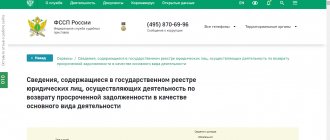If you are not confident that you will be able to repay the debt on time, it is better not to contact microfinance organizations, just like with any creditor.
If there is a serious debt, it is not the MFO employees who can demand a refund, but the collectors.
The new law curtailed their rights and opportunities. But not all collection agencies adhere to legal methods when collecting debt.
What can debt collectors do?
Federal Law of the Russian Federation No. 230, adopted in 2020, significantly limited the rights of collection agencies and individual collectors in methods of debt collection. Now no structure can simply call itself a collection agency and start “knocking out debts.” First of all, the agency must obtain accreditation, after which it is included in the register. You can check for yourself whether the company is included in it on the FSSP website. If the agency is not listed there, but is trying to demand a debt from you, you can safely contact the police.
An MFO has the right to use the services of collectors only if there is a clause in the loan agreement that states the possibility of involving third parties. Between the microfinance organization and the agency is:
- Agency contract.
- An assignment agreement, according to which the debt is resold to collectors.
According to Federal Law No. 230, collectors have the right to demand repayment of debt only from the person who signed the loan agreement with the MFO. Collectors are prohibited from contacting strangers, including family members!
There are time limits for making phone calls and sending SMS. Now on weekdays collectors are prohibited from calling from 22-00 to 08-00 , and on weekends from 21-00 to 08-00 . The rest of the time, they are allowed to make calls and send SMS and emails reminding them of the amount of debt and repayment terms.
Collectors have the right to schedule personal meetings with borrowers, the purpose of which is to reach an agreement on debt repayment. You can appear at them accompanied by witnesses. At the meeting, collectors must present a possible debt repayment scheme.
If you are afraid that collectors may file a claim for debt collection in court, know that this is only possible if there is an assignment agreement. If an agency agreement has simply been signed with an MFO, they will not accept a statement of claim.
Causing property damage and harm to health, threats, blackmail are subject to the Criminal Code of the Russian Federation and the Civil Code of the Russian Federation, and therefore are prohibited even without the Law on Collectors. This also includes all sorts of insulting inscriptions addressed to debtors, which they love to leave in hallways.

The existence of collection agencies has been called into question
The bell is ringing for collectors
Representatives of United Russia and the Liberal Democratic Party submitted to the chamber for consideration a draft law “On the prohibition of attracting other persons to interact with the debtor.”
In fact, the bill proposes to introduce a ban on the activities of collection agencies in the Russian Federation. The National Association of Professional Collection Agencies (NAPCA) responded to the initiative. Its head, Elman Mehdiyev, described the proposal as populist and superficial. In an interview with TASS, he concludes that stopping work with overdue debt will lead to an increase in the burden on the budget due to an increase in lawsuits.
According to the text of the document, the bill “in order to protect the rights and legitimate interests of individuals in terms of taking actions aimed at returning overdue debts of individuals, prohibits the activities on the territory of the Russian Federation of legal entities carrying out activities to return overdue debts as their main activity.” The bill proposes to prohibit “the creditor’s involvement of other persons to interact with the debtor aimed at returning the overdue debt.”
The increase by a third in the number of complaints about the actions of debt collectors, which State Duma deputies Sergei Vostretsov (United Russia) and Yuri Volkov (LDPR) refer to, believes Vyacheslav Maksimenko, head of partnership programs at the investment and educational platform “Lineyka”, is connected more with the increase in legal literacy of the population and caused by the actions of “black creditors” who are outside the legal framework. But, he is sure, it is difficult to make similar claims against collectors. The expert referred to NAPCA data, according to which gross violations by collectors, such as methods of “psychological influence”, account for only 8% of the total number of violations, the rest is exceeding the permitted number of contacts, violation of call times, calls to third parties and disclosure of personal data .
The latter is solved through the work of regulators and self-regulatory organizations, the analyst believes. Eliminating collection agencies, as proposed by the bill, will not improve statistics and will create chaos, he says. The burden on the judicial system will increase, as it will be easier for banks to solve problems directly through the courts and use the same loopholes in the legislation in pre-trial collection that collectors now use.
Instead of banning collection activities, it is necessary to clarify the legislation, believes Vyacheslav Maksimenko. The State Duma may soon consider a bill “On activities for the return of overdue debts of individuals” to replace the law on the collection of debts of individuals. It is assumed that there will be a mandatory pre-trial procedure for the return of overdue debts after 30 days (now from the first day), as well as the inclusion in the FSSP register of not only collectors, but also banks. In accordance with the regulatory guillotine roadmap, the law should be submitted to the State Duma in March 2020. The current legislative initiative may not receive support among deputies, since it initially did not pass the internal party committee.
Don’t “knock out”, but help
And yet, it is impossible to agree with NAPCA’s position, argues Nurida Ibragimova, head of the quality control department at NUS Amulex. After all, it’s no secret that collection agencies often act in bad faith, violate the rights of debtors, and for most of these violations, the victims do not even file complaints. And the realization that if you find yourself in a difficult life situation, no one will call with veiled threats is still somewhat reassuring. The creditors themselves act more carefully, fearing for their license, reputation, or the application of penalties to them based on complaints from debtors.
If all collectors are removed, then creditors will be forced to independently work with debtors and will create departments to interact with them, which, in principle, already exists in large organizations, points out Nurida Ibragimova. But this, in turn, is a costly endeavor, and with the current volumes of lending, even large creditors do not have enough staff to negotiate debt collection. After the statute of limitations established by the company expires (it can be 3-4 years, 5 years or more), large creditors write off the debt as irrecoverable, which is clearly a direct loss, or assign the right to claim debts to third parties.
One of the options for solving the problem of debt repayment is to issue loans to persons whose income allows them to repay the debt, that is, efforts must be made to verify the client’s solvency, the lawyer believes. For the most part, in microfinance organizations there is no question of any solvency check. The result is a situation where a loan is provided to a person who is unable to repay the debt, which is also growing exponentially.
Another solution to the problem could be a loyal attitude towards clients by changing the terms of the loan: providing deferment, installment plans, or “vacations” for debtors who find themselves in a difficult situation. It is also possible to propose changing the sequence of payment of debts, since it is normal for creditors to establish the order of repayment of penalties first, then interest on the loan, and lastly the principal debt, which often does not reduce it in any way. But the situation when the principal debt is repaid first, and then all interest and penalties, will stop the growth of debts, but financial organizations do not agree to this because they do not want to lose profits.
The essence of the threat
Despite the adoption of the new Federal Law No. 230, there are still many “black” collectors on the market, i.e. those who work outside the legal field. They may even be included in the FSSP register, but adhere to illegal methods. For example, when concluding an assignment agreement, the terms of the primary loan agreement cannot be changed. But in the end it turns out that the debt was sold to collectors, and they, in turn, charged inflated interest. Despite the fact that the growth of debt in any circumstances should be suspended if the amount exceeds 3 times the original loan.
Plus, unscrupulous collectors like to come to debtors’ homes in groups of several people, threaten and damage personal property. Threats may be made against your close relatives, so warn them in advance about this possibility.
Collectors may come and threaten to break down the door at night. In such a situation, call the police immediately.
How to behave
If you have used the services of an MFO and have not repaid the debt, then the main advice is to pay off the debt. You will have to do this anyway.

When communicating with debt collectors, adhere to the following rules:
- Be polite and do not be rude, even if you are provoked to do so. At the same time, make it clear that you know your legal rights.
- If someone comes to your home at any time of the day, you do not need to open the door. If you threaten to break it, call the police immediately.
- Record telephone conversations with debt collectors, but only by warning them out loud in advance that a recording will be made and stating the current date and month. Otherwise, it will not be possible to use this recording as evidence. If you receive a call, always ask for the caller's full name and credentials.
- Save all electronic and paper letters from microfinance organizations and debt collectors.
- Try not to walk down the street at night, especially alone. Do not enter the entrance if you see strangers in or around it.
- Avoid large crowds of people.
- Buy a new SIM card and change your mobile phone number, then you will not be harassed by multiple calls.
- If you have the opportunity to move temporarily, move.
- Do not leave your car near your house. It’s better to drive him to a guarded parking lot, especially at night.
If your debt is not sold to a collection agency, it is simply an intermediary between the MFO and you. This means that you can respond to all requests from collectors and that the issues will be resolved in court.
Where to go for help
There are several government agencies to protect the life and health of citizens. If there is a threat, be sure to contact:
- Any police department. If collectors violate the norms of Federal Law No. 230, contact the police. It is necessary to call the nearest department if debt collectors come to your house, demand to open the door, or try to somehow restrain you or family members, or damage property, for example, scratch a car.
- Investigative committee . Contact the Investigative Committee if the matter has taken a serious turn. For example, debt collectors threaten the life and health of you and your loved ones. Remember that in this case it is better to be on the safe side.
If the actions of a collection agency and microfinance organization violate the law, for example, they demand inflated interest rates on a debt, you should contact the regulatory authority to choose from:
- Rospotrebnadzor.
- Prosecutor's office.
If you cannot come in person to submit a complaint, you can send it electronically through the official website.
Supervisory authorities are required to conduct an investigation into the complaint within 2 weeks. If they determine the presence of violations, penalties will be imposed on the MFO and the collection agency. The latter may even lose its accreditation. The Prosecutor's Office and Rospotrebnadzor are obliged to provide you with a written response upon the fact of the inspection. If you wish, you can go to court with him.
Please note in advance that the judge will make a decision on the need to repay the debt. But at the same time it will reduce illegally inflated interest rates. And if you have a very difficult financial situation, for example, if you lose your job, the penalty may be removed completely, but this is at his discretion.
Alternative options
- The Internet is full of advertisements for anti-collector services. If you are confident in the people who offer them, contact them. Anti-collection agencies have good lawyers who can help you resolve the situation competently.
- If there are no good reviews about the company’s activities, you should know that often anti-collection agencies act in collusion with microfinance organizations. In this case, they will simply scam you out of your money.
Who is responsible for what?
Yandex notes that they act as distributors of advertising, and therefore do not have the right to check their advertisers for compliance of their activities with legal norms. The FAS notes that, according to the law on advertising, goods and services cannot be advertised if their sale requires permission, but in fact there is none.
On the other hand, 230-FZ does not describe all types of debt collection relations. Moreover, if persons are advertised who carry out activities not described in this Federal Law, then placement of advertising is possible in compliance with other legislative norms. Distributors are only responsible for placing advertisements that may directly lead to criminal liability. Violations in this case are determined by the FAS. If violations are detected, the service will issue an order to the advertising distributor, who will have to remove the advertisement or adjust it.
But even if violations of the law on advertising are revealed, collectors will not be responsible for it, but for the fact that they operate without being on the register. This is already regulated by the relevant law, and it is also possible to charge the violator under a criminal article for illegal business.
It is possible to protect citizens from illegal collection agencies only by developing law enforcement practice or introducing changes to the relevant law. It is necessary to close the loophole in the law, and this requires either specification in the law of the concept of “main activity”, or the definition of an accurate OKVED for the provision of such services.
What to do if the debt collector violated the law and your rights
If collection agency employees are clearly violating your civil rights, you should not let it slide. The situation will only get worse further. Therefore, first of all, try to record all conversations on audio and video media.
In case of any threats, be sure to contact the police. Remember that there are supervisory authorities. There is no commercial structure that is not afraid of inspection by Rospotrebnadzor and the Prosecutor's Office, so feel free to contact them if there are any violations.
File a complaint against the collection agency. What can you do with it:
- Take it personally to the office.
- Send by registered mail.
- Leave an electronic complaint on the official website.
If you do not respond to the illegality of actions, collectors will complicate the situation. And your life, health, and property may suffer from this.
How to open a collection agency in 2020
Several years ago, there was a real lending boom throughout the country. Only the rich and lazy did not take out consumer loans. When the economic crisis hit, many people lost their jobs and, accordingly, the ability to pay off their loan debts.
To get their money back, banks are forced to turn to specialized agencies that, for a certain fee, help repay debts. We will discuss how to open a collection agency from scratch in this article. Features of the business Collection agencies are engaged in collecting debts from individuals and legal entities.
conclusions
- Try to pay off debts to microfinance organizations.
- If collectors start working on you, be calm and confident.
- The law is on your side; in case of violations by collectors, contact the police or supervisory authorities.
- Try to be polite and don't be rude until the last minute. Don't break the law on your part.
- If all else fails, the collectors are not far behind - try to sign out and temporarily move to another area, or better yet, a city.
Why check debt collectors in the registry?
It is necessary to use the collector register in a number of cases:
- You or your loved ones have an outstanding debt;
- You are accused of debts that you have nothing to do with or have long been closed;
- Collectors have filed a claim against you;
It is important to understand that you should not hide from debt collectors. The state has worked on various levers for safe interaction between collectors and debtors. Therefore, if desired, the client can always limit unwanted communication to a minimum or refuse it altogether.
Our collector registry operates online. Therefore, you can check organizations at any time convenient for you!









